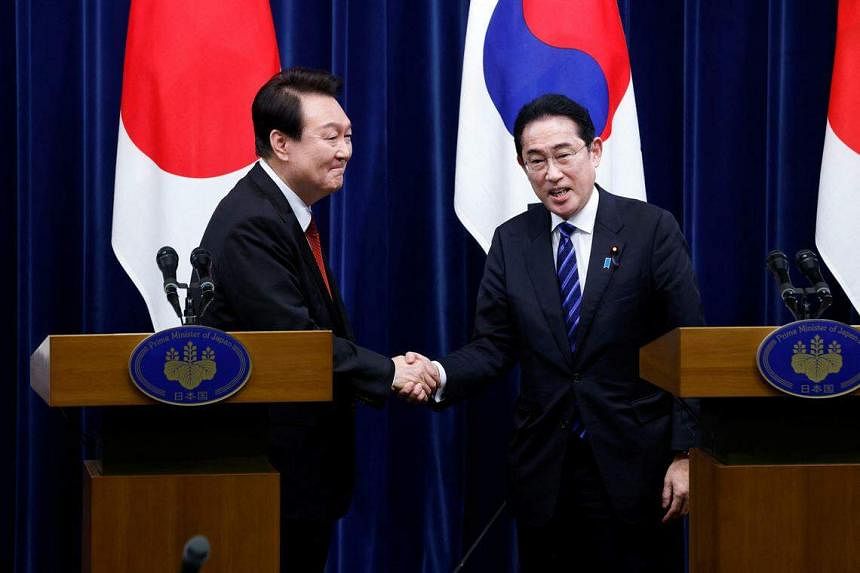SEOUL - With Japanese Prime Minister Fumio Kishida visiting Seoul on Sunday, South Korea and Japan are set to resume so-called shuttle diplomacy, amid warming ties that have given a boost to trilateral cooperation with their mutual ally, the United States.
Shuttle diplomacy, which involves regular meetings between the leaders of the two countries, was last seen in 2011.
Bilateral ties then froze over spats related to history and trade, until the conservative administration of South Korean President Yoon Suk-yeol took office in 2022 and made proactive efforts to resolve the thorny issue of compensation for wartime forced labour.
Signs of a thaw emerged in March, when Mr Kishida invited Mr Yoon to Tokyo to discuss ways to normalise ties at a summit and over sukiyaki, omurice and beer.
The reciprocal working visit to Seoul will serve as a “good opportunity to frankly exchange opinions on ways to develop Japan-South Korea relations and the rapidly changing international situation”, Mr Kishida said on Monday.
The two leaders are set to hold a summit on Sunday to discuss issues such as national security, advanced industries and cultural exchanges, according to South Korea’s presidential office.
They will then hold a joint press conference and have a casual dinner together with their spouses.
Mr Yoon has voiced hope for the friendship between the two countries to “gradually expand” with the resumption of shuttle diplomacy.
The detente comes at a time when they need to work closely with the US to address the growing missile and nuclear threat posed by North Korea, as well as to curb China’s growing ambitions and influence in the region.
Mr Yoon returned last week from a state visit to Washington, during which the US and South Korea agreed to strengthen “extended deterrence” against North Korea, which Japan could also play a role in.
Experts welcomed Mr Kishida’s visit, saying it will pave the way for deepening trilateral cooperation among Washington, Tokyo and Seoul.
A three-way meeting between Mr Kishida, Mr Yoon and US President Joe Biden is slated to be held on the sidelines of the Group of Seven (G-7) summit in Hiroshima, to be held on May 19-21.
Sunday’s visit “highlights the Japanese government’s readiness to accelerate the rapprochement between Seoul and Tokyo” and “provides a basis for cautious optimism”, said Dr Tongfi Kim, research professor in Asian geopolitics at the Brussels-based Centre for Security, Diplomacy and Strategy.
“By reinstating shuttle diplomacy, President Yoon will achieve a significant diplomatic victory before his first year in office concludes,” added Dr Kim, referring to Mr Yoon’s inauguration on May 10, 2022.
The Korean leader’s “amicable stance towards Washington and Tokyo is appreciated by the US and Japan”, he added.
However, Dr Kim also noted that President Yoon faced domestic criticism for his conciliatory gestures towards Japan.
Opposition parties and activists had lambasted his administration’s plan to compensate forced labour victims through a state-run foundation instead of demanding reparation from Japanese companies that owed wages to the victims, with many saying it was akin to “national humiliation”.
Observers are watching to see if Mr Kishida will make any gestures regarding the issue. It seems unlikely, as Japan maintains that all claims and damages related to Japan’s colonial rule of the Korean peninsula between 1910 and 1945 and during World War II had been settled under a 1965 agreement to normalise ties.
Mr Kishida and Mr Yoon are “being strategic by making diplomacy more consistent”, said Dr Leif-Eric Easley, associate professor of international studies at Ewha Womans University in Seoul.
“Resuming shuttle diplomacy means regular high-level meetings can drive cooperation,” he told The Straits Times.
“Comprehensive agreements can face political backlash and roadblocks in implementation. Addressing difficult issues and policy goals in piecemeal fashion offers better odds for improving Korea-Japan relations than a big-bang approach.”
Mr Kishida’s trip, which ends on Monday, marks the first bilateral visit by a Japanese leader in 12 years.
Former president Shinzo Abe had visited in 2018, but it was to attend the Pyeongchang Winter Olympics, not for bilateral meetings.
In Seoul, Mr Kishida will also meet six business leaders, including SK Group chairman Chey Tae-won, to discuss ways to resume economic exchanges between the two countries and how to jointly respond to supply chain challenges in industries such as semiconductors.
Mr Kishida will be given the highest level of security protection, according to South Korea’s presidential office.
This will reportedly include the deployment of the presidential security service, the police and the military, besides the forming of a single command structure and creation of extra security zones.


